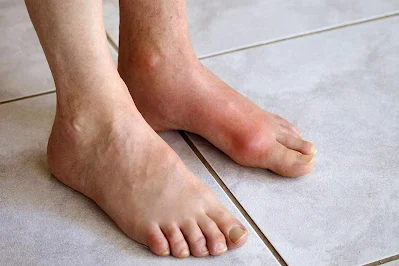Gout is frequently caused by kidney dysfunction. Gout, on the other hand, can cause kidney disease. Because uric acid is filtered by the kidneys, the two disorders are linked. Gout affects one out of every ten persons with chronic kidney disease, and an even larger proportion of patients with gout have kidney disease.
Your joints will swell and hurt if you have gout. Given that gout is a chronic condition with no known treatment, it often lasts the entirety of a person's life.
Gout episodes occur suddenly and can be severe; they are also known as flares or flare-ups. You can have pain, swelling, and/or redness in your joints during a gout episode. Gout attacks may affect every joint in your body, including the elbows, knees, hands, and ankles, but the big toe is where they most frequently occur. Extremely painful, gout can be challenging to manage. Acute or chronic gout are both possible.
What exactly causes Gout?
Having too much uric acid in your blood results in gout. Your body converts purines, a class of molecules, into uric acid. Your body naturally contains purines, and some foods also contain them. Your body either produces too much uric acid or is unable to adequately get rid of it when you have gout.
Urate crystals, which are small crystals that can form when uric acid builds up in the fluid around your joints, can appear. Gout symptoms including pain and swelling are brought on by urate crystals. Your chance of developing gout might rise due to a number of factors. Gout has several causes, one of which being kidney illness.
Kidney function and uric acid
Your blood carries uric acid to your kidneys. The uric acid is then added by your kidneys to your urine so that it may exit the body. But occasionally, the level of uric acid in the blood rises too high. This occurs when the body produces too much uric acid or because the kidneys are unable to add enough uric acid to the urine, causing it to accumulate in the blood (the more common reason).
Therefore, having gout and having a high uric acid level may be indicators of renal illness; therefore, if you have gout, have your kidney function tested.
Can gout cause kidney disease?
There is proof gout can cause Kidney disease. Although there is little evidence for this association, many gout-focused clinicians hold the widespread notion that it causes renal illness. When you have gout, your blood contains an excessive amount of uric acid. Urate crystals can develop as uric acid accumulates during the kidneys' filtering of blood.
As the urate crystals pass through your kidneys, they can cause damage and scars. This kidney damage is thought to lead to kidney disease and failure over time, especially if your gout is left untreated. NSAIDs, some of the most common pain-relieving medicines for gout, can also lead to kidney disease over time. Talk to your doctor about how to manage your use of NSAIDs.
Side effects of untreated gout:
If gout is left untreated, it can last a very long time and affect several joints simultaneously in both the lower and upper body. Joint injury is a possibility at this point, and discomfort is ongoing. Numerous other body areas are also capable of developing Tophi.
Uric acid crystals can form kidney stones and hurt the kidneys by blocking the kidneys from removing wastes, which can cause infection. And that's eventually leads to chronic kidney disease (CKD).
Living with chronic gout and chronic kidney disease
It can be challenging to treat gout when you also have renal disease since some medications, like NSAIDs, are harmful to the kidneys. When you have a renal illness, you should modify or avoid using some of the most popular medications for acute and chronic gout.
However, there are unquestionably certain things you can do to manage these illnesses and enhance your general health like to:
- Maintain a diet free of alcohol, high-fructose corn syrup, and meals with a lot of sugar
- Consume a diet high in fruits, vegetables, and whole grains to stay healthy. Consult your doctor or a nutritionist about controlling your diet if you must follow a restricted diet due to renal illness
- To keep physically healthy, you should work out for at least 30 minutes a day, five days a week
- Keep blood sugar levels under control
- Keep your blood pressure levels at reasonable levels


0 Comments
Post a Comment
Share your views